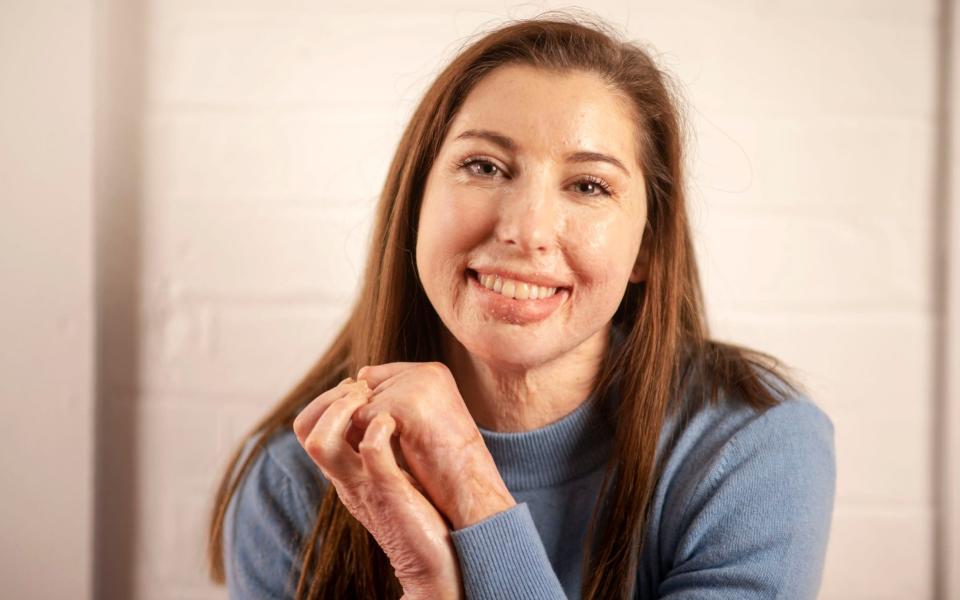'I survived having burns on 96 per cent of my body - it's what you make of life afterwards that counts'


It was the end of the ski season, and Catrin Pugh was ready to go back to North Wales. The 19-year-old had been away for five months, working in France’s Alpe D’huez resort on her gap year, and couldn’t wait to be reunited with her parents - and her mum’s tarragon cream chicken. It was them she was thinking of as she fell asleep on the coach taking her down the winding Alps.
She was woken by screams. “The driver was shouting that the breaks weren’t working, and the coach was speeding up,” she recalls. Catrin, who was sitting at the front, had a clear view of what lay ahead: a sharp cliff edge.
“I was convinced we were going to die,” she says. “I had flashbacks to our family Christmases skiing and felt awful that I hadn’t called my parents much. I said goodbye to everyone I loved in my mind.”
But at the last moment, the driver managed to turn the wheel. The coach veered away from the cliff edge and crashed into the mountain wall. It exploded into flames. Everyone managed to scramble off - except for the driver and Catrin. “My then boyfriend ran back on to the blazing bus,” she says. “He found me on the floor, on fire.”
Having dragged Catrin off, her friends rushed to stamp out the flames. She still remembers their faces as the extent of her injuries became clear. “I could see in their eyes how bad it was,” she says, quietly. “I couldn’t sit up. I looked at my arm and it was multicoloured; black, brown and red.”
Catrin had sustained third-degree burns on 96 per cent of her body - only her scalp and the soles of her feet were unscathed. She was airlifted to hospital and put into an induced coma, which she stayed in for three months. Medics told her family she had a 0.1 per cent chance of survival. But against the odds, she pulled through - one of few adults in the world believed to have survived such extensive burns.
She recalls waking up in Merseyside’s Whiston hospital, unable to move, covered in skin grafts, with several fingers amputated. All the other passengers had survived with minimal injuries thanks to the heroic actions of driver Maurice Wrightson, who had tragically lost his life.
Five years on, Catrin is calm as she explains how it took eight months for the reality to sink in.
“I remember being in the bath,” she says. “I looked like a quilt. My mum and brother had donated skin from their legs, and my body was red and brown, with staples, stitches and swelling. I was five stone and could see my skeleton. I couldn’t move - only blink and talk. In that moment, it hit me. I broke down and cried, and didn’t stop for two months.”
For a year, Catrin was depressed. She refused counselling and didn’t try physiotherapy, not believing she would ever walk again. Her desperate parents, Sarah and Carl, both teachers from Wrexham, didn’t know how to help. Catrin had always been ‘the strong one’ - full of optimism.
Things only changed when she was visited by a fellow survivor; a woman who had experienced 80 per cent burns a decade earlier, and learned to walk again.
“It was the kick I needed,” admits Catrin. “She made me realise that my life was life worth living. It changed my mindset. I went back to being a positive person - determined to get better, and to do for others what she’d done for me.”

Over the next two years, Catrin progressed from being wheelchair-bound to slowly walking and, finally, gingerly skiing down the French slopes she’d loved since childhood. “For me, the mountains are the most serene place in the world,” she smiles.
At the same time, she made plans. The accident had forced Catrin to turn down a place at Manchester University to study events but, now aged 24, she is in her first few months of a physiotherapy degree at King’s College London. She is living in student accommodation and confidently wears sleeveless crop tops around campus, but she is terrified of going on her first online date - “it all revolves around one picture, which is obviously scary for me” - and hates it when people point at her in the street.
“Sometimes I think it would be easier if I looked like every other girl,” she says. “But then I wouldn’t be doing such amazing things. My life is different to what I imagined, but I would say it’s probably better.”
Her face glows as she talks about being an ambassador for charity Changing Faces, through which she hopes to inspires others to live with visible differences. “I want to work with burn survivors, so they don’t have to wait for that one person to give them a positive mindset,” she explains.
“Anything can happen to anyone and it’s what you make of life afterwards. I’m so much stronger than I ever thought. But it could have gone a different way. For those who aren’t that lucky, I want to be someone they can look up to.”
The Telegraph is supporting Changing Faces as part of its Christmas Charity Appeal in 2018. To donate, call 0151 284 1927 or visit telegraph.ctdonate.org.

